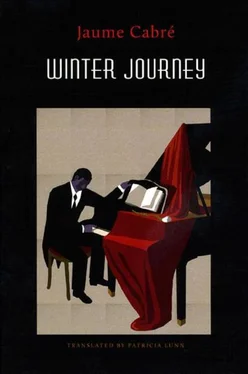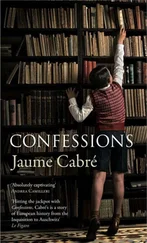"Listen, why don't we talk some other time?"
"If music keeps you from being happy, quit music, you told me."
"Listen, we'll talk about this, all right?"
"I've seen Schubert." Peter's desperate voice.
"Schubert?" Instinctively, Zoltan looked towards the tomb. But he went back immediately to watching the door to the handicapped stalls.
"Peter, listen. 1…"
"Fine, fine."
"Call me some other time, all right?"
"I love you. With all my heart. Remember that."
Peter hung up, too brusquely perhaps, and Zoltan had to do the same, thoughtfully. What had he wanted to say? Just as he was about to conclude that Pere Bros had big problems, he was distracted by a chubby individual coming out of the men's restroom, whom he hadn't seen go in. He concentrated on his door and forgot about his friend's distant lament because the throbbing of his recovered hope blocked it out. He couldn't act like a big brother when his heart was exploding. He started walking back and forth in front of the restrooms, patient and impatient, thinking about important things like, for example, it was inexcusable that in their time together he still hadn't asked her what had happened, why she was in a wheelchair. What's that about an accident, Margit, what happened to you?
He was distracted by a couple his age with a young, pretty girl, maybe their daughter. They'd just come through the gate and he deduced from their gestures as they looked at a map that they were looking for the tombs on his side. He felt envious of them. He followed them with his eyes as they went in the right direction. He looked, almost annoyed, at the restroom doors. Of course, if she couldn't manage, poor Margit… It was starting to rain again. He examined the sky and his watch and exhaled with some impatience. Instead of opening the umbrella again, he opened the door to the bathrooms and stepped into a corridor with two closed doors.
"Margit?"
Nobody answered.
"Margherita?"
He pushed hard on one of the doors. The stall was empty.
"Margit?" His voice more rattled.
He pushed the other door. That stall was empty too. Now he shouted.
"Margit!"
Back in the corridor, he realized that there was another door in the back wall. He ran to it. It opened onto the lobby. He asked the guard if he'd seen a lady in a wheelchair, wearing some yellow thing, and the guard, showing a tooth broken by life, said, Yes, a lady with gray hair, very elegant, very beautiful. And Zoltan, grasping his wrist, Exactly! And the guard: Well, she just left in a taxi that was waiting for her. Going where? To Vienna. Is there a taxi stand? Not here. Farther on, where the bus stops, there is. The best thing is the streetcar, if you want to go back to Vienna.
Zoltan hadn't heard the last part because he'd started running desperately in the direction of Vienna, hoping to catch a stray taxi.
He heard the bell of the 72 when he was almost at the stop. He got on and went to the front, to calm his impatience.
He made the trip with his eyes open and his lungs aching. They didn't pass any taxis, the windows of the streetcar were steaming up, and he was coming to terms with a new loss. Two taxis crossed their path and Margit was in neither of them. When they got to the end of the line, next to the Ring, Zoltan, all hope gone, didn't get off the streetcar as he'd done on the day she left him forever for the first time. Despondent, he started to cry and the lively smell of the white carnation in his lapel came to him in a cruel whiff. Margit had sunk out of sight again. Margit, whom he knew only as Margherita, who always ran away from happiness and now lived in a downtown apartment, in a building with an elevator.
The conductor glanced at him in the rearview mirror, but decided not to look for trouble just yet. Zoltan straightened up and, with a deep sigh, leaned back against the seat. Then he leaned his head towards the steamy, dirty window, as if he were a night owl coming back from an especially hard night, his tie askew, the cheery carnation hanging from his buttonhole, his eyes bleary as an alcoholic's. Because the music to Thou hast not to hear my steps, and 1 close softly. 1 write for thee above the door to the house "Good night" was playing in his head, he shakily wrote Good night, Margit on the steamy glass, so you know 1 thought of you. Through the letters, Zoltan glimpsed the old man walking barefoot on the icy ground, his hurdy-gurdy in his hand, recalling distant moments of happiness, and he started to sing, to the indignation of the conductor, who now stood up angrily with the intention of kicking that drunk off his streetcar. Zoltan sang from the deepest sorrow, in his insecure baritone voice, Old man of the stories, shall I walk with thee? When I sing my verses, wilt thou play with me? He let the tears fall from his eyes as he looked unseeing through the letters written on the glass at a piece of the city that would be even more unbearable now, though he knew he would not leave it. As the conductor was telling him to behave and get off the vehicle, from the depths of his forgotten memory came a B-flat, A, D-flat, B, C that he'd carried inside for years, Kaspar Fischer's theme urging him to look forward, be brave, believe himself capable of remaking the future, as if it were the main theme of his Hymn to the Ability to Live without Thinking about Beloved Margit. He rejected the idea as he yielded to the conductor's appeals and got up fromhis seat. He couldn't emulate a prophet like Kaspar Fischer; he was just a person.
Then he understood that there was no choice, that he couldn't leave Vienna, that life is not the road or even the destination, but the journey, and when we disappear it's in the middle of the trip, wherever that may be. It was his bad luck that his lot was a hard winter journey that had left his soul in ruins.

The stories in this collection were written over a relatively long period of time. The oldest, in its first version, dates from 1982, and all were finished in 2000. What's interesting is that 1 never got them right the first time. With one exception, the original version didn't turn out to be the one 1 considered definitive. In many cases the themes and issues were right, but the tone was still off. For years I've felt somewhat perplexed about what turned out to be these pages, because 1 had stories and ideas, but 1 wasn't pleased with what 1 made of them. Once, after finishing The Shadow of the Eunuch, on which I'd spent many years, 1 started working hard on the stories, thinking that the time had come to demystify them and make them mine. But 1 had to recognize, after many fruitless sessions, that either these stories had no reason to exist or 1 had no reason to exist for them. When 1 finally understood that stories have legs, 1 changed tactics, and as Lao Tse recommends-according to Quiquin-I sat quite still outside my cabin door and waited until one day the stories passed by, and 1 grabbed them by the throat and made them explain themselves. So, with great patience, 1 figured out the secret of each story, one by one, the reason why the first line or first word of a story had occurred to me or maybe the precise or vague idea of a literarily edifying ending that could exist only in relation to a beginning that 1 didn't yet know. The final versions, new versions of the majority of the fourteen stories, have brought me many surprises. Maybe the biggest surprise is the realization that everything in life is related. 1 thought 1 was putting together a collection of totally independent stories, since the ambience of each story demanded this independence, but the reality of working on them these last few months, in the same span of time, has made me aware of the threads, some secret and others more obvious, that tie them all to one another. I also got to know and, in a way, to love characters who exist without the advantages enjoyed by characters in novels, because living in a story is like spending your whole life in one of those Japanese hotels that seem like a decompression chamber for divers. These characters, like their stories, are often based on what is, but is not said.
Читать дальше













